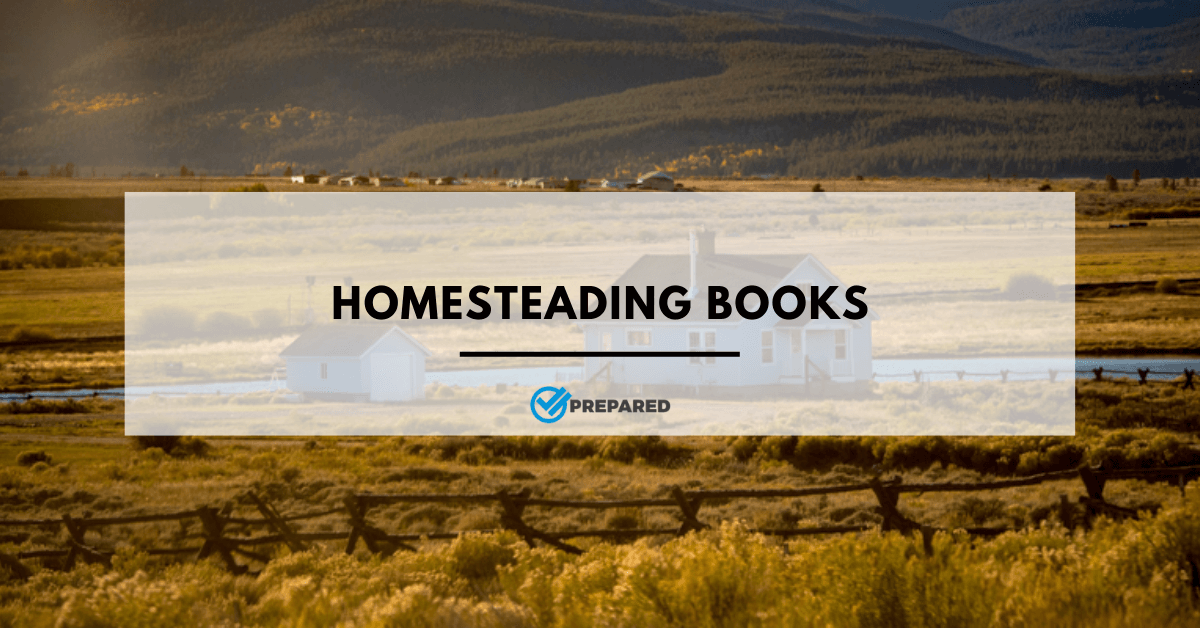If you are interested in learning what it takes to be self-sufficient, you are going to have a lot of questions. The best thing to do is some research. The following five homesteading books are going to give you a great inside look into what it takes to live on a homestead and produce the majority of your food. It is a lot of work, but it is extremely rewarding.
Each of these homesteading books can provide you with insight as well as some useful information to turn your homesteading into a successful venture. Don’t forget to check out the honourable mentions as well. You can never have too much information.
Book 1: The Backyard Homestead
This book is the homesteading Bible for anyone who lives on a small plot of land, in the suburbs or even on a city lot. This book is great for those interested in learning about maximizing space and is geared more towards beginners. Think of it more as a guide for “gentleman farmers” who want the freedom to grow their own food, without the hassle of a big piece of property. It provides a ton of information for those interested in getting started, but is not going to do a lot of good for those who live on large, established homesteads. This book is great for anyone who wants to see what self-sufficient living is all about and provides plenty of tips to help you get started without a huge investment.
Book 2: The Encyclopedia of Country Living
The 50th-anniversary edition was released in 2019. This book is for anyone, from beginners to self-proclaimed experts. You will find years of tried and trusted tricks that relate to growing food, preserving food, raising animals, butchering and every other little thing that comes up when you are living the country life. You will find lots of recipes as well. This book has been a best-seller for decades for a very good reason. It is a good idea to get one of these encyclopaedias on your shelf for quick reference when you need it.
Book 3: The Weekend Homesteader
Published in 2012, this book is another one geared towards those who want to be more self-sufficient on their terms. You don’t have to run out and buy 10 acres and never go to a grocery store again. This book guides you with baby steps. It allows you to ease into homesteading based on the season. You will get a feel for what full-time homesteading is like and be able to decide if it’s right for you. This book gives you an inside look at some of the various tasks that are part of the typical routine for anyone who homesteads.
Book 4: The Backyard Homestead Guide to Raising Farm Animals
If you have a small or large piece of land, you need to know how to raise your own animals to provide another source of food for your family. Whether you are ready to go big or small, this book will show you the way. You will discover the best breeds for your needs and what it takes to raise healthy animals, including their food and shelter needs. Animal husbandry is also an important element to sustainable living, which this book covers as well.
Book 5: Country Wisdom and Know-How
This is a must-have. The illustrations and collections of tips and tricks on every element of homesteading make it an all-inclusive book. You will get the luxury of learning from hundreds of people from all around the world without ever leaving your house. This book is like calling up your grandfather and asking his advice. One of the biggest complaints about this book—there is so much information packed into it, the text is fairly small. If you can, get this on your Kindle so you can increase the size of the text. You can read this book a hundred times and discover something new every, single time.
Honourable mention homesteading books
In addition to my five favourites, there are also three additional honourable mentions.
Honourable Mention 1: Root Cellaring
This book covers a topic many new homesteaders don’t think about until it is too late—preserving your bountiful harvest. This book will give you all the information you need to plan out a root cellar. Root cellars require some pretty specific requirements to be useful. This book will help you choose the best place to build your root cellar on your property and how to properly store your harvest. If you have a homestead, you need this book…and a root cellar.
Honourable Mention 2: DIY Projects for the Self-Sufficient Homeowner
Part of homesteading is learning to do with what you have and that includes building things you will need to run your homestead. This book covers 25 projects that can make your homestead a little more efficient and easier to manage. Each project is carefully outlined and is not going to cost you a fortune to construct.
Honourable Mention 3: Four-Season Harvest
Four-Season Harvest: Organic Vegetables from Your Home Garden All Year Long by Eliot Coleman.
What many new homesteaders fail to realize is the fact you need to put food on the table all year round. Fresh veggies are a must and this guide will show you how to grow—even in the dead of winter. You will get some great tips on how to keep your plants warm and thriving when the availability of sunlight and warmth is an issue. This book is one every homesteader should have if they truly want to be self-sufficient throughout the entire year.
These 8 homesteading books should provide you with sufficient information to get you started on your homesteading journey. Let us know if there are any great homesteading books we did not include on our list. Alternatively, if you need more information, look at our previous post titled Homesteading for Beginners.

Chris was born and raised in South Africa and has worked in the field of risk management, organisational resilience, and business continuity for more than a decade. During his career he has seen how private and public sector organisations benefit from effective risk management and business continuity planning. Realising that families and communities can also benefit from the same tools, methodologies, and principles, he started Prepare with Foresight.
Prepare with Foresight was launched to assist individuals and families to have the peace of mind that they will be able to recover from and successfully adapt to the consequences of adverse events.

